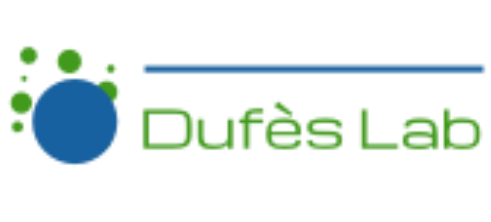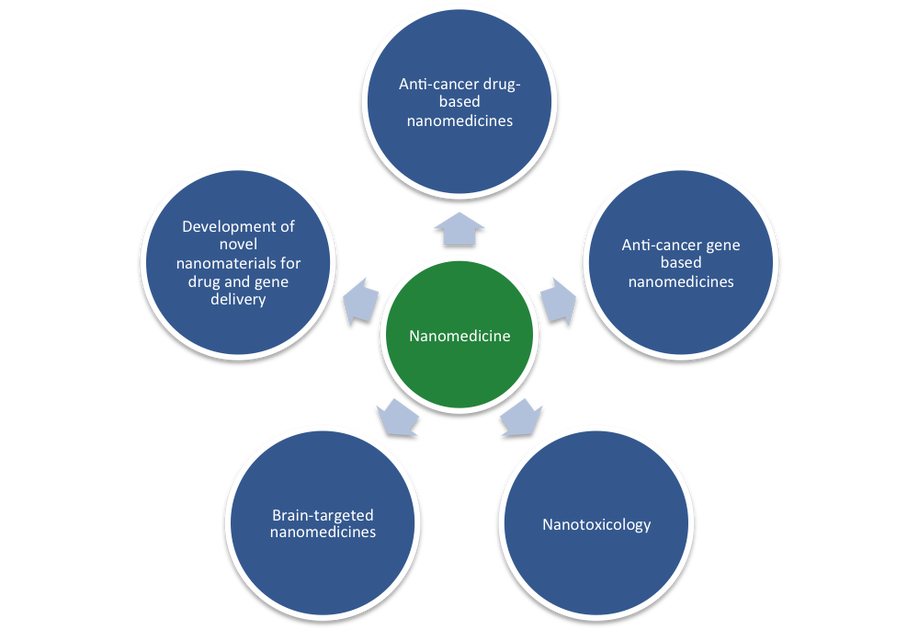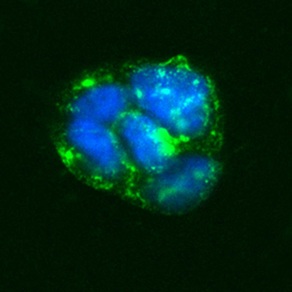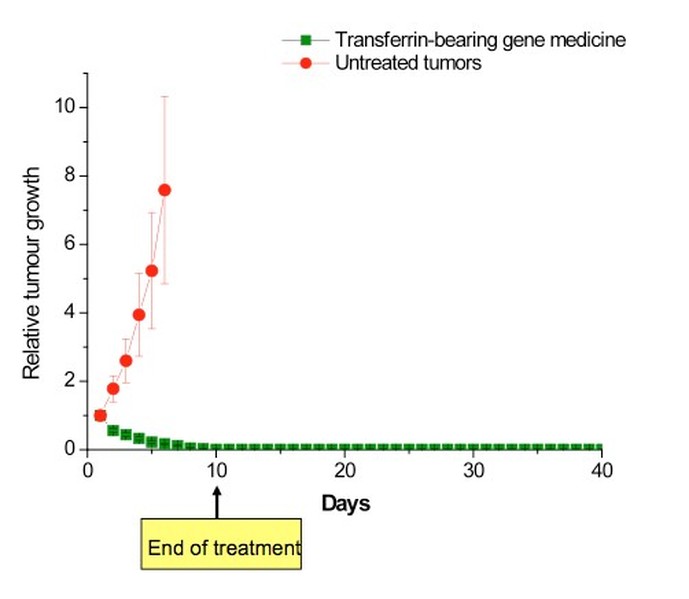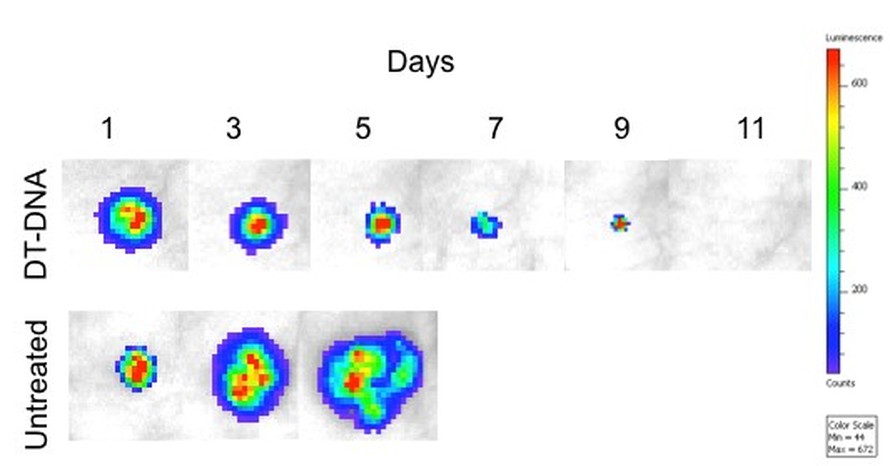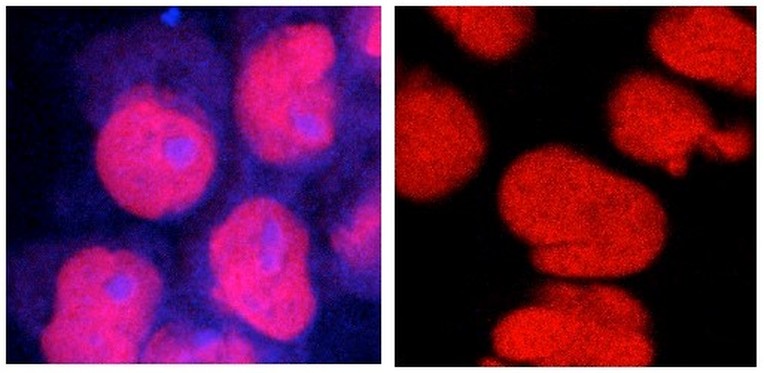Research themes
Research Highlights
Podcast about recent research results:
DNA-based nanomedicines for cancer therapy
- Tumour regression/disappearance after intravenous administration of a novel tumour-targeted polypropylenimine dendrimer combined with Tumour Necrosis Factor (TNFα) expression plasmid, with complete disappearance of 90% of the tested tumours and regression of the remaining ones. These results are highly important, as there is currently no gene medicine commercially available for the intravenous treatment of cancer. This work was published in Journal of Controlled Release (JCR), made the cover and the editorial of the journal (Koppu et al., 2010, Lim et al., 2015). The Editor of JCR described these results as being “highly remarkable and interesting”, concluding that “for now Dr. Dufès seems to be at the forefront of achieving such a goal” (talking about clinical trials). This work led to wide international press coverage.
- Tumour regression/disappearance after intravenous administration of a novel tumour-targeted polypropylenimine dendrimer combined with p73 expression plasmid, with complete disappearance of 10% of the tested tumours and long-term survival of the animals. It is the first time that a tumour-targeted p73 could lead to tumour suppression after intravenous administration. This work was published in Biomaterials.
- Regression/disappearance of prostate tumours following the intravenous administration of a novel tumour-targeted polypropylenimine dendrimer combined with either TNFα, TRAIL and IL-12 expression plasmids, with complete disappearance of up to 70% of PC-3 tumours and up to 50% of DU145 tumours. It is the first demonstration of the efficacy of gene therapy for prostate cancer in laboratory settings (Al Robaian et al., 2014; Altwaijry et al., 2018).
- Tumour regression/disappearance after intravenous administration of a novel tumour-targeted polypropylenimine dendrimer combined with Tumour Necrosis Factor (TNFα) expression plasmid, with complete disappearance of complete suppression of 60% of A431 tumours and up to 50% of B16-F10 tumours over one month. This manuscript was published in Nanomedicine: Nanotechnology, Biology and Medicine. The Editor of this journal classified the article as of “potential clinical significance” and commented that “the positive findings in animal studies should provide the basis for further clinical studies”.
- Development of new tumour targeting-gold nanocages conjugated with polyethylenimine and polyethylene glycol, and tumour-targeting, dendrimer-bearing gold nanocages. They are highly promising gene delivery systems to prostate cancer cells. Their efficacy is achieved without the need for external stimulation such as photothermal therapy required for gold nanoparticles (Almowalad et al., 2021 and 2022).
- Increase of gene expression in tumours by surface modification of polyethylenimine and polypropylenimine dendrimers with the amino acids arginine, lysine and leucine. This work was published in Biomaterials and Nanomedicine: Nanotechnology, Biology and Medicine. It led to an article on The Wellcome Trust Blog:
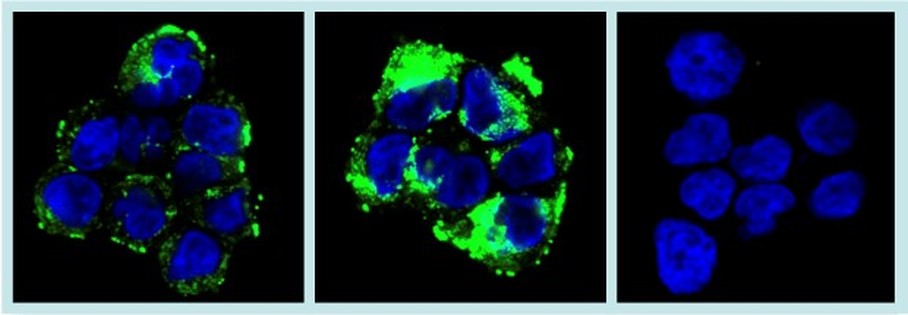
Confocal microscopy imaging of the cellular uptake of fluorescently-labelled DNA either complexed with polypropylenimine dendrimer bearing arginine (left) or lysine (middle) after incubation for 24 hours with A431 epidermoid carcinoma cells (control: DNA solution (right) (Blue: Nuclei stained with DAPI, green: fluorescently-labelled DNA)(Aldawsari et al., 2011).
DNA-based nanomedicines for brain delivery
- Increase of gene expression in the brain following intravenous injection of transferrin-bearing dendriplex (at least twice higher than that of the unmodified dendriplex), while decreasing the non-specific gene expression in the lung. Gene expression was at least 3-fold higher in the brain than in any tested peripheral organs. This work was published in Journal of Controlled Release (Somani et al., 2014).
- Increase of gene expression in the brain following intravenous injection of lactoferrin-bearing dendriplex (by more than 6-fold compared to that of the unmodified dendriplex), while decreasing the non-specific gene expression in the lung and the kidneys. Gene expression was significantly higher in the brain than in any other tested peripheral organs. The administered gene was expressed in the hippocampus, which plays an important role in consolidating information from short-term memory into long-term memory. It is a primary site for Alzheimer's pathology, which makes gene expression in this brain area particularly interesting for future therapeutic developments. This work was published in Journal of Controlled Release (Somani et al., 2015).
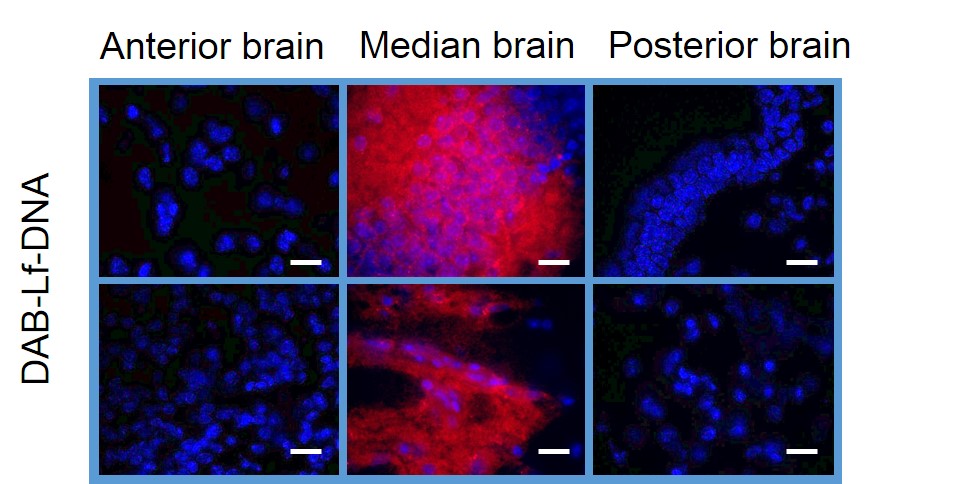
Epifluorescence microscopy imaging of the distribution of gene expression within the anterior, median and posterior brain areas after a single intravenous injection of tdTomato- encoded DNA (50 µg) either complexed with DAB-Lf or in solution (Blue: nuclei stained with DAPI, red: tdTomato expression) (Bar: 10 µm).
Drug-based nanomedicines for cancer therapy
- Synergy between docetaxel and mebendazole (collaborative work with Professor Hing Leung (Principal Investigator), the Beatson Institute for Cancer Research). Docetaxel chemotherapy in prostate cancer has a modest impact on survival. To date, efforts to develop combination therapies have not translated into new treatments. We performed a drug repurposing screen using murine-derived prostate cancer cell lines driven by clinically-relevant genotypes and demonstrated that mebendazole (an anthelmintic drug that inhibits microtubule assembly) potently synergises docetaxel-mediated cell kill in vitro and in vivo. Liposomes entrapping docetaxel and mebendazole suppressed in vivo prostate tumour growth and extended progression-free survival. Our data supports a new concept of combined mebendazole/docetaxel treatment that warrants further clinical evaluation (Rushworth et al., 2020).
Press release:
https://www.strath.ac.uk/whystrathclyde/news/worminfectiondrugcouldbeusedtotreatprostatecancer/
- Tumour regression/disappearance after intravenous administration of the vitamin E extract tocotrienol entrapped in novel tumour-targeted vesicles, with complete disappearance of 40% of the melanoma tumours. This work corresponds to the first preparation of a tumour-targeted delivery system able to encapsulate tocotrienol. It is the first time that a tocotrienol formulation can lead to tumour suppression. This work was the object of wide international press coverage, led to 2 publications in JCR (Fu et al., 2009, 2011; Karim et al., 2017). The last publication was mentioned in the editorial as showing “highly efficient tumoricidal activity” and “further research […] is expected to bring a new dimension to targeted drug delivery”.
https://web.archive.org/web/20130603203923/http://www.strath.ac.uk/press/newsreleases/2010/headline_398684_en.html
- Tumour regression/disappearance after intravenous administration of the green tea extract epigallocatechin gallate encapsulated in novel tumour-targeted vesicles, with complete disappearance of 40% of the tumours for both tested tumour types. It is the first time that a green tea extract was shown to have an anti-cancer therapeutic effect (Lemarié et al., 2013). This publication was the object of wide international press coverage, including interviews by Fuji TV (Japanese TV) and by Allure magazine (US magazine).
- Tumour regression/disappearance after intravenous administration of plumbagin, a natural compound extracted from the officinal leadwort, encapsulated in novel tumour-targeted formulations (liposomes, nanoparticles, and lipid–polymer hybrid nanoparticles). This administration resulted in complete disappearance of up to 40% of B16-F10 tumours and tumour regression for up to 30% of the tumours. It is the first time that plumbagin was shown to have an anti-cancer therapeutic effect (Sakpakdeejaroen et al., 2019, 2020 and 2021).
- Demonstration that the presence of the human plasma-based protein corona coating PEGylated zein micelles did not limit their uptake by melanoma cells, but decreased their uptake by macrophages and dendritic cells. This is the first report of a delivery system positively affected by the presence of protein corona on its surface, presenting a promising avenue for future cancer therapy developments (Meewan et al., 2022).
- Development of new redox-sensitive dendrimersomes that can be used as drug and gene delivery systems for combination cancer therapy. They were able to entrap both hydrophilic and hydrophobic agents, coupled with redox-responsive sustained release of the entrapped guests. They were able to condense DNA, and increased gene expression in prostate cancer cells by 5-fold compared to that observed when treated with DNA (Laskar et al., 2018, 2019, 2021).
